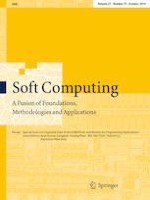09.10.2018 | Methodologies and Application
New operations on pseudo-octagonal fuzzy numbers and its application
Erschienen in: Soft Computing | Ausgabe 19/2019
EinloggenAktivieren Sie unsere intelligente Suche, um passende Fachinhalte oder Patente zu finden.
Wählen Sie Textabschnitte aus um mit Künstlicher Intelligenz passenden Patente zu finden. powered by
Markieren Sie Textabschnitte, um KI-gestützt weitere passende Inhalte zu finden. powered by
